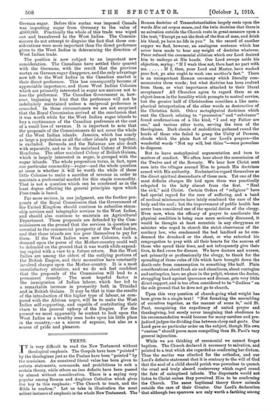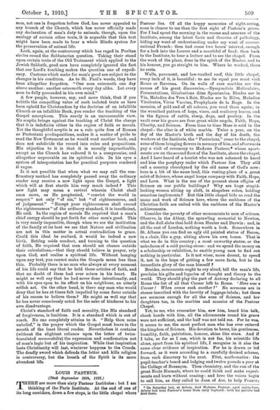TEXTS.
TT is very difficult to read the New Testament without theological emphasis. The Gospels have been "pointed" by the theologians just as the Psalms have been "pointed" by the musicians. An unnatural literal value has been given to certain statements, commands, and prohibitions to suit a certain theory, while others no less definite have been passed by almost without consideration. There is a saying very popular among Roman and Anglican Catholics which gives the key to this emphasis : " The Church to teach, and the Bible to confirm." Let us take in illustration the most salient instance of emphasis in the whole New Testament. The Roman doctrine of Transubstantiation largely rests upon the words Hoc est corpus melon, and the twin doctrine that there is no salvation outside the Church rests in great measure upon a like text, "Except ye eat the flesh of the Son of man, and drink his blood, ye have no life in you." In the record of another supper we find, however, an analogous sentence which has never been made to bear any weight of doctrine whatever.
Peter refused the ceremonial ablution which our Lord desired him to undergo at His hands. Our Lord sweeps aside his objection, saying " If I wash thee not, thou halt no part with me. . . . . . If I, then, your Lord and Master, have washed your feet, ye also ought to wash one another's feet." There is an unimportant Roman ceremony which literally com- memorates these words ; but what doctrine has been evolved from them, or what importance attached to their literal acceptance P All Churches agree to regard them as an object-lesson in the humility which prompts to mutual service, but the greater half of Christendom considers a like meta- phorical interpretation of the other words as destructive of the Christian faith. Other metaphysical doctrines which rent the Church relating to "procession" and " substance" found confirmations of a like kind, " I and my Father are one," and various other texts, serving the turn of the theologians. Dark clouds of malediction gathered round the heads of those who failed to grasp the Unity of Persons, clouds which the plain fact of our Lord's prayers—the wonderful words "Not my will, but thine "—were powerless to disperse.
But to leave metaphysical argumentation and turn to matters of conduct. We often hear about the commission of the Twelve and of the Seventy. We hear how Christ sent men into the villages around Him to preach His doctrines armed with His authority. Ecclesiastics regard themselves as the direct spiritual descendants of these men. Yet one of the most definite charges He laid upon them was practically relegated to the laity almost from the first. " Heal the sick," said Christ. Certain Orders of " religious " have had special regard for the care of suffering, and a band of medical missionaries have lately combined the care of the body and the soul ; but the improvement of public health has never been considered one of the special duties of the clergy. Even now, when the efficacy of prayer to ameliorate the physical condition is being once more seriously discussed, it would be thought at least eccentric in any clergyman or minister who urged in church the strict observance of the sanitary law, who condemned the bad landlord as he con- demned the drunkard or the cheat, or who exhorted his congregation to pray with all their hearts for the success of those who spend their time, and not infrequently give their lives, to find cures for disease. We have doctors and nurses, not primarily or professionally the clergy, to thank for the spreading of those rules of life which have brought down the death-rate from consumption to something like half. Plain considerations about fresh air and cleanliness, about contagion and antiseptics, have no place in the pulpit, whence the doctor, struggling bard against ignorance and disease, gets very little direct support, and is too often considered to be " Godless " on the sole ground that he does not go to church.
Upon this very question of church-going what weight has been given to a single text I "Not forsaking the assembling of ourselves together, as the manner of some is," said St. Paul, recognising the expediency of united prayer and thanksgiving, but surely never imagining that obedience to his recommendation would become for many careless and pre. jndiced judges the dividing-line between sheep and goats. Our Lord gave no particular order on the subject, though His own "custom" should prove more compelling than St. Paul's very general injunction.
While we are thinking of ceremonial we cannot forget baptism. The Church declared it necessary to salvation, and pointed to a text which she regarded as confirming her dictum. Thus the matter was clinched for the orthodox, and our Lord's definite statement that it is contrary to the will of God that the soul of a child should perish was powerless to quench the cruel and truly absurd controversy which raged round the fate of unbaptised infants. The disputants would not listen to Christ unless they perceived Him to be confirming the Church. The same baptismal theory threw animals outside the care of their Creator. Our Lord's declaration that although two sparrows are only worth a farthing among men, not one is forgotten before God, has never appealed to any branch of the Church, which has never officially made any declaration of man's duty to animals, though, upon the analogy of certain other texts, it is arguable that this text might have been made to bear a whole Hindu system for the preservation of animal life.
Look, again, at the controversy which has raged in Puritan circles round the Sabbatarian question. Taking their stand upon certain texts of the Old Testament which applied to the Jewish Sabbath, good men have completely ignored the fact that our Lord's teaching makes the question one of expedi- ency. Customs which make for man's good are subject to the changes in his condition. As to St. Paul's words, they have been altogether forgotten. " One man esteemeth one day above another: another esteemeth every day alike. Let every man be fully persuaded in his own mind."
A few people, however, say, and more think, that if you belittle the compelling value of such isolated texts as have been upheld for Christendom by the doctrine of an infallible Church or an infallible Book, you render the teaching of the Gospel amorphous. This surely is an unreasonable view. No sceptic brings against the teaching of Christ the charge that it is indefinite either in the region of faith or morals. Yet the thoughtful sceptic is as a rule quite free of Roman or Protestant predispositions, makes it a matter of pride to read the New Testament as he would read another book, and does not subdivide the record into rules and propositions. His objection to it is that it is morally impracticable, except as the Church has reduced it to a compromise, and altogether unprovable on its spiritual side. In his eyes a system of interpretation has for practical purposes rendered it vague.
Is it not possible that when what we may call the con- firmatory method has completely passed away the ordinary reader may receive a new light upon the Gospel, a light which will at first startle him very much indeed P This new light may mean a revival wherein Christ shall once more, as He prophesied, " convict the world in respect " not only " of sin," but " of righteousness, and of judgement." " Except your righteousness shall exceed the righteousness" of the ordinary standard, it is insufficient, He said. In the region of morals He required that a man's chief energy should be put forth for other men's good. This is very nearly impossible, though when we see the institution of the family at its best we see that Nature and civilisation are not in this matter in actual contradiction to grace. Could this ideal be realised, it would be indeed a new birth. Setting aside conduct, and turning to the question of faith, He required that men should set chance outside their calculations,—that they should believe in prayer, rely upon God, and realise a spiritual life. Without hanging upon any text, you cannot make the Gospels mean less than this. Probably there is no man who always at every moment of his life could say that he held these articles of faith, and that no doubt of them had ever arisen in his heart. He might as well say that he had never done intentionally, and with his eyes open to its effect on his neighbour, an utterly selfish act. On the other hand, is there any man who would deny that he has at times felt impelled by some force outside of his reason to believe them ? He might as well say that he has never consciously acted for the sake of kindness to his own disadvantage.
Christ's standard of faith and morality, like His standard of forgiveness, is limitless. It is a standard which is out of reach. No one completely attains to it. " Help thou mine unbelief," is the prayer which the Gospel must leave in the mouth of the least literal reader. Nevertheless it contains (without the slightest reliance upon the letter of twice- translated memorabilia) the expression and confirmation not of man's logic but of his inspiration. While that inspiration lasts Christianity will last, whatever happens to the Creeds. The deadly sword which defends the letter and kills religion is controversy, but the breath of the Spirit is its more abundant life.



























































 Previous page
Previous page